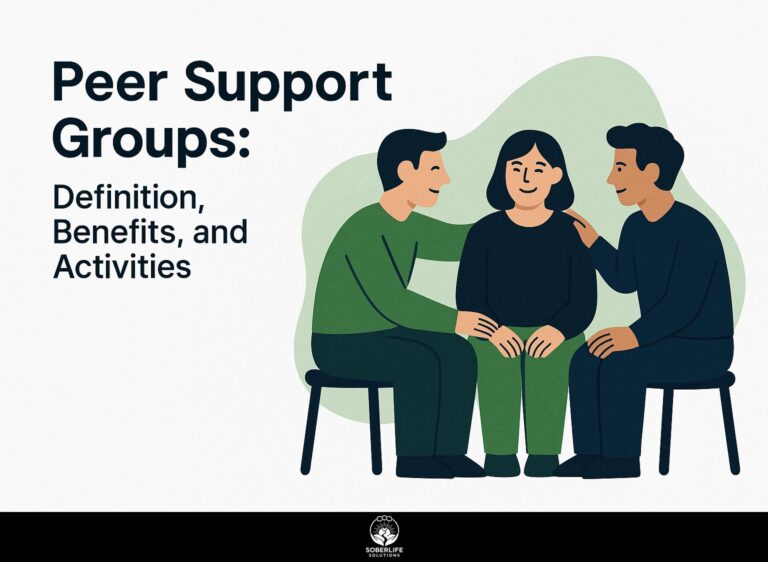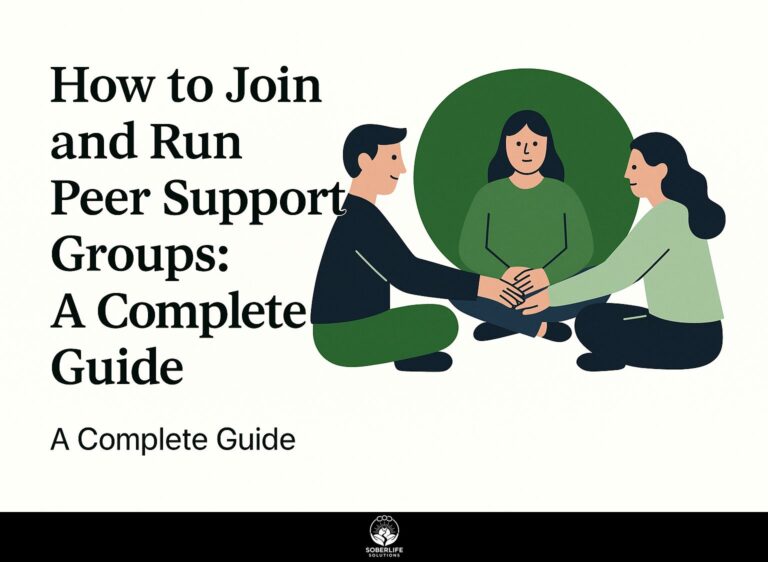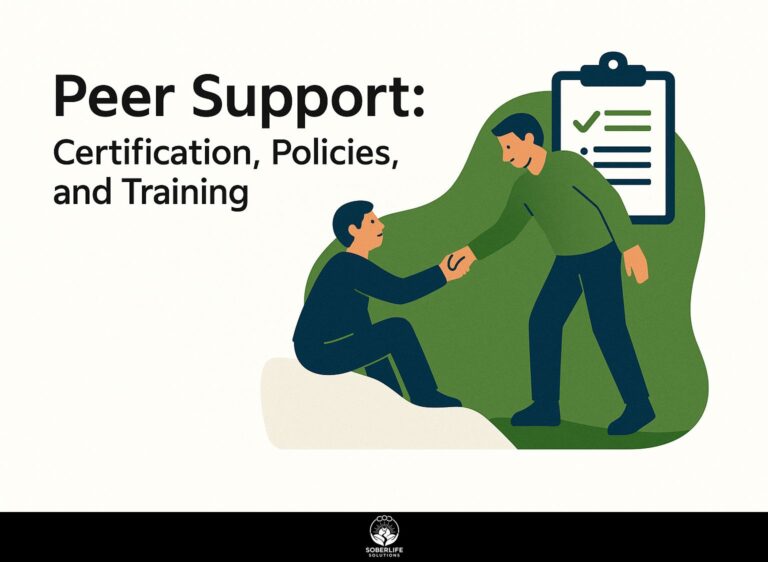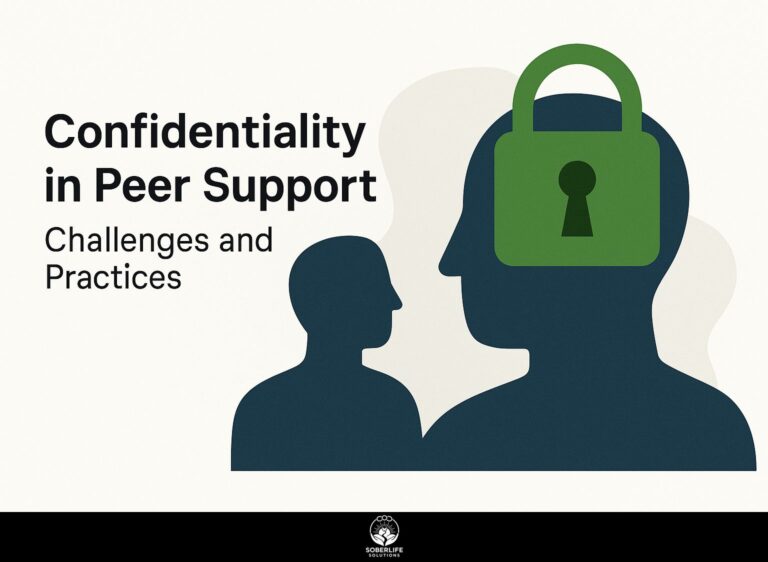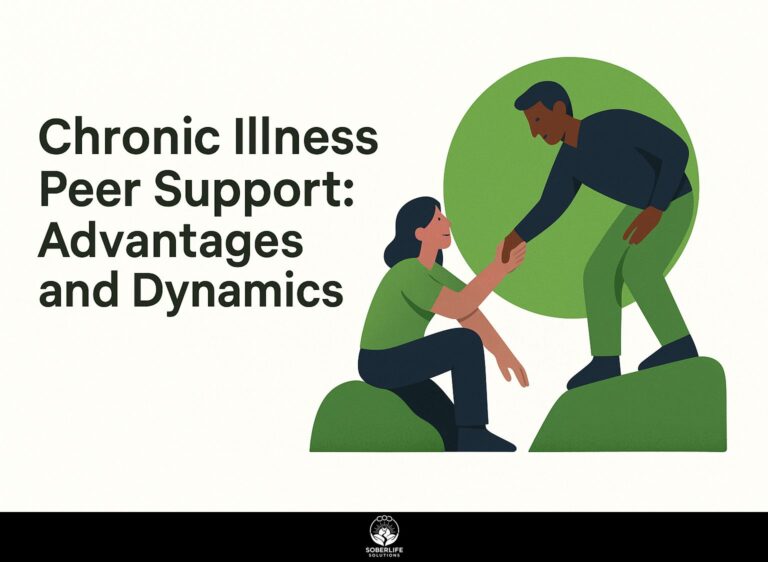Alcoholics Anonymous: Meetings and Joining Process
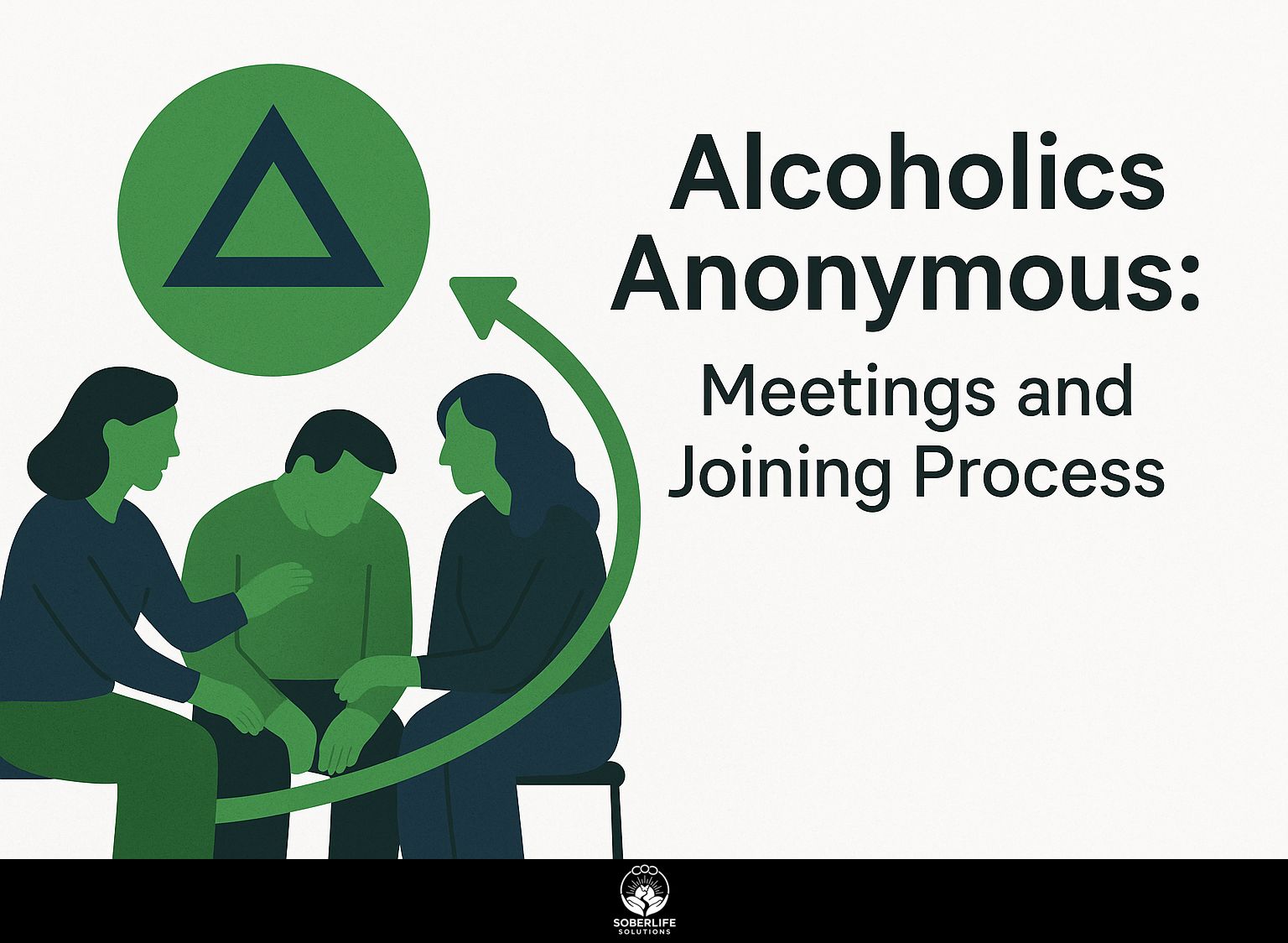
Recovering from alcoholism can be challenging, but Alcoholics Anonymous (A.A.) provides help through its various A.A. groups. This guide will help you understand meetings and how to join a group, whether you are thinking about joining a new group or asking for help from the General Service Office (GSO). Learn how Alcoholics Anonymous builds a supportive group that offers empathy and recovery as you begin your path to better health.
Key Takeaways:
History and Purpose
A.A. began with Bill Wilson and Dr. Bob Smith, who created the Twelve Steps to help alcoholics achieve sobriety and build supportive communities. According to a detailed account in A Visual History of Alcoholics Anonymous on Amazon, these foundations have been crucial in shaping A.A.’s enduring legacy.
Over the years, A.A. has faced historical challenges, including stigma surrounding addiction and the need for wider accessibility.
Its purpose has evolved to support various meeting formats, including in-person, virtual, and literature-based gatherings. This flexibility allows people from different backgrounds to join, as mentioned in our detailed overview of Alcoholics Anonymous meeting types.
A.A. strongly values privacy, creating a secure space for people to share their stories without worry.
Staying together is important, as members are urged to help each other, strengthening the shared goal of getting better and developing personally.
Types of Meetings
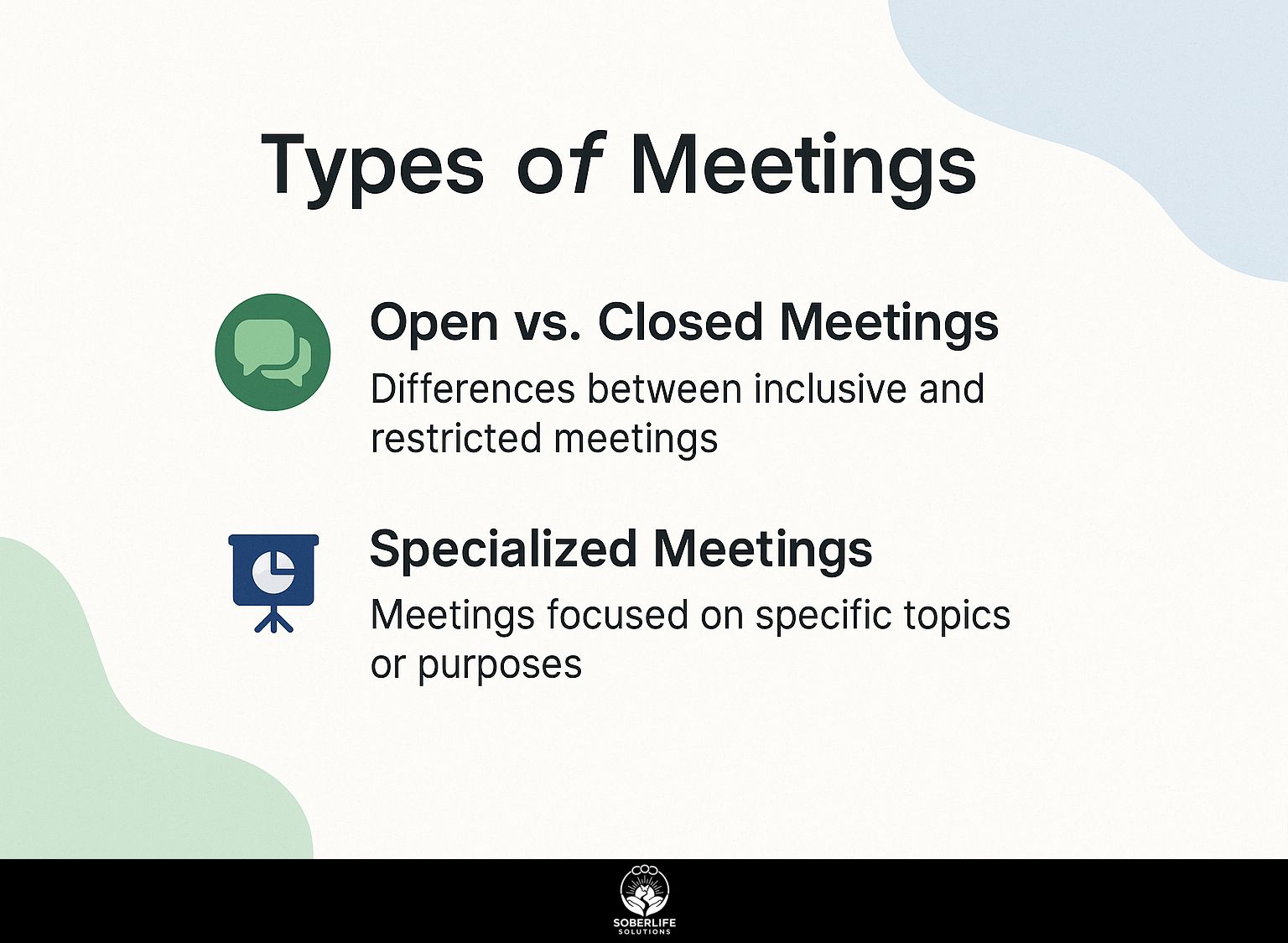
Knowing the different kinds of A.A. meetings is important for beginners, as it helps them find the best option for their recovery process. For those interested in a comprehensive overview, this analysis by HelpGuide covers the types, benefits, and expectations of support groups, adding valuable insights for anyone starting their journey. Those curious about specific Alcoholics Anonymous meeting types might appreciate our detailed guide on A.A. meeting formats.
Open vs. Closed Meetings
Open meetings welcome anyone interested in A.A. while closed meetings are exclusive to individuals who identify as alcoholics, ensuring a safe space for sharing.
Open meetings help people learn more about Alcoholics Anonymous. These meetings allow friends, family, and others interested to join and find out about the recovery process. This area can support new members in becoming part of the group, helping them feel comfortable.
In contrast, closed meetings focus on privacy and close bonds among people who share personal challenges, encouraging more open and honest conversations.
For those new to recovery, going to both types of meetings can help you find out which environment makes you feel more at ease and provides the support you need.
Specialized Meetings
Specialized meetings cater to unique demographics or situations, such as beginner meetings or groups for specific populations like women or LGBTQ+ members.
These meetings provide individual support and promote a sense of belonging in the wider A.A. community. For instance, beginner meetings offer new members a safe space to share experiences and ask questions, often led by someone with a solid recovery background.
According to LinkedIn’s guidance on creating support groups, tailoring meetings to specific populations can enhance the support structure by addressing unique challenges. Women’s groups focus on the unique challenges women face in recovery, encouraging open discussions about relevant issues.
Similarly, LGBTQ+ meetings focus on common experiences and social issues, encouraging inclusivity and awareness.
By joining these special meetings, people can make connections that help their recovery process. For those interested in understanding how different support systems can enhance recovery, [this overview of effective sober support systems](https://soberlifesolutions.com/sober-support-systems-that-help/) can provide valuable insights.
Meeting Formats
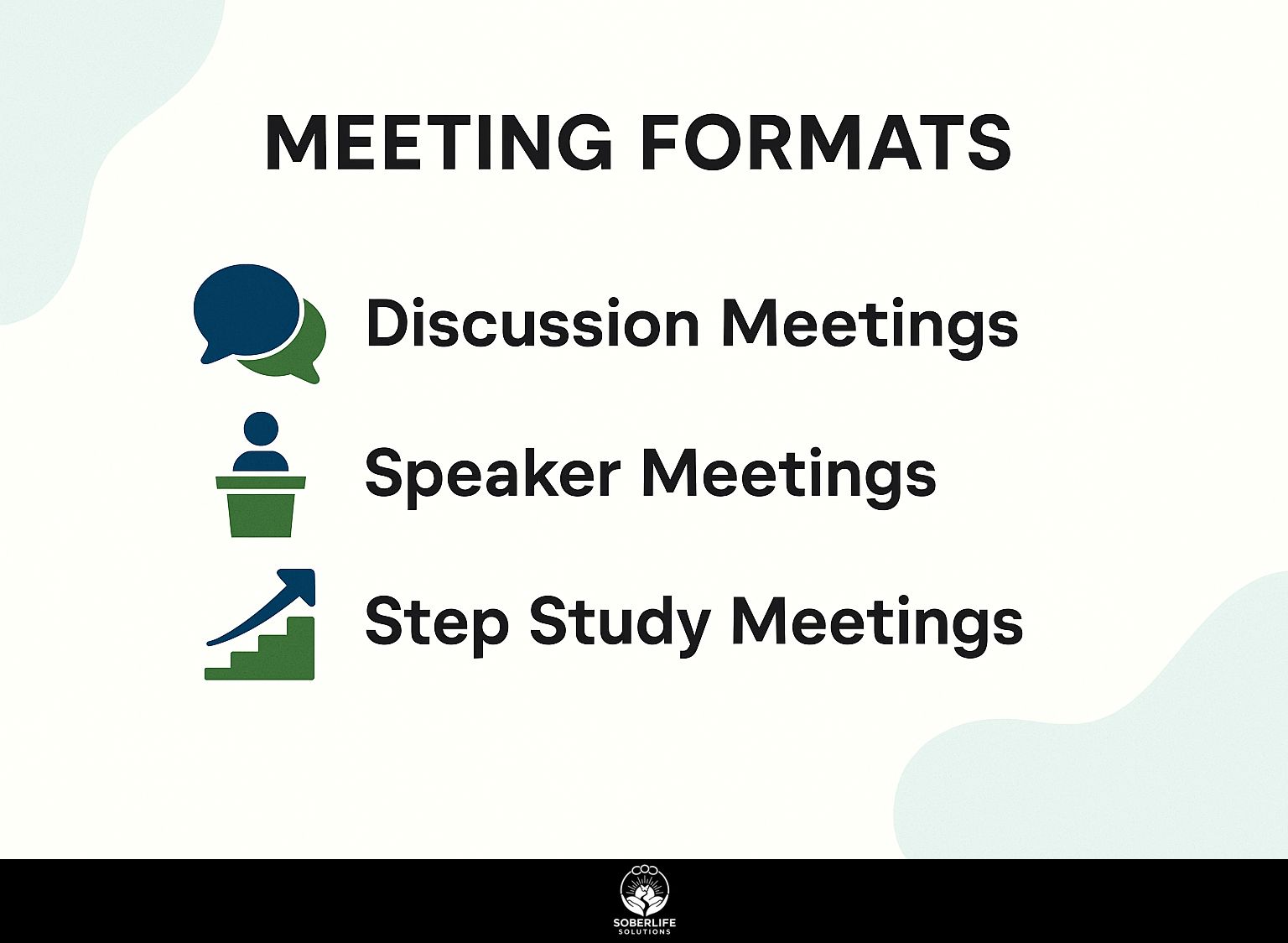
The structure of A.A. meetings can affect how participants interact and discuss recovery subjects.
Discussion Meetings
Discussion meetings encourage open conversation, allowing members to share their experiences and thoughts about their recovery process.
These meetings usually focus on topics like how to handle challenges, what may cause stress, or important personal achievements, helping people support each other.
For example, in a recent meeting, participants discussed handling social situations that may lead to relapse, sharing personal anecdotes and effective coping techniques.
Using tools like discussion prompts or planned questions helps everyone participate. Setting aside time for feedback helps strengthen connections and encourages follow-up discussions.
This method helps people communicate more effectively and supports them in their personal path to recovery.
Speaker Meetings
Speaker meetings involve individuals sharing personal experiences, offering support and knowledge about recovery.
These meetings typically last about an hour and include a 30-minute sharing segment followed by a Q&A session.
For instance, in a recent meeting, a member recounted their struggles with addiction, detailing how they overcame setbacks and found support in the community. This connected with attendees and encouraged them to share their experiences, creating a feeling of unity.
By focusing on true stories of success, speaker meetings can inspire and motivate participants to remain dedicated to their paths of recovery.
Step Study Meetings
-
Step study meetings focus on the Twelve Steps, providing a clear structure for members to look at each step and discuss its significance in detail.
-
During these meetings, participants typically use resources such as the Big Book, which outlines personal stories and the program’s philosophy, and the Twelve Steps pamphlet that offers concise explanations of each step.
-
Members often talk about what each step means to them and share their experiences, leading to open talks. This teamwork approach helps each person learn better while creating a sense of community, enabling members to help each other during recovery.
-
Meetings generally last around an hour, enabling ample time for exploration and dialogue.
Joining Alcoholics Anonymous
Joining A.A. is easy, with minimal criteria, allowing anyone who wants help with alcoholism to join. For those interested in the virtual format, our step-by-step guide for newcomers provides a comprehensive walkthrough of joining online A.A. meetings.
Eligibility Criteria
Anyone who wants to quit drinking can join A.A., making the program accessible to all who need support.
This inclusive approach means that anyone who recognizes their struggle with alcohol can attend meetings without judgment.
Members share personal experiences and support one another, creating a safe environment for recovery.
To find a nearby A.A. group, go to the A.A. website and use the directory to look up groups by zip code or city.
Meetings take many forms, including discussion groups and speaker sessions, allowing newcomers to choose the setting that feels most comfortable for them.
How to Find a Meeting
Finding an A.A. meeting is simple, with many tools available, such as online resources and local A.A. service offices that offer schedules and locations.
To locate a meeting, start by visiting the official A.A. website, where you can use the ‘Find a Meeting’ feature. Simply enter your zip code or city to view nearby meetings.
Alternatively, download the A.A. mobile app, which allows you to search for meetings by your current location. Contacting your local intergroup can also yield detailed schedules and any special events.
For example, if you’re in New York City, the local intergroup website lists dozens of daily meetings, catering to various times and preferences.
What to Expect at a Meeting
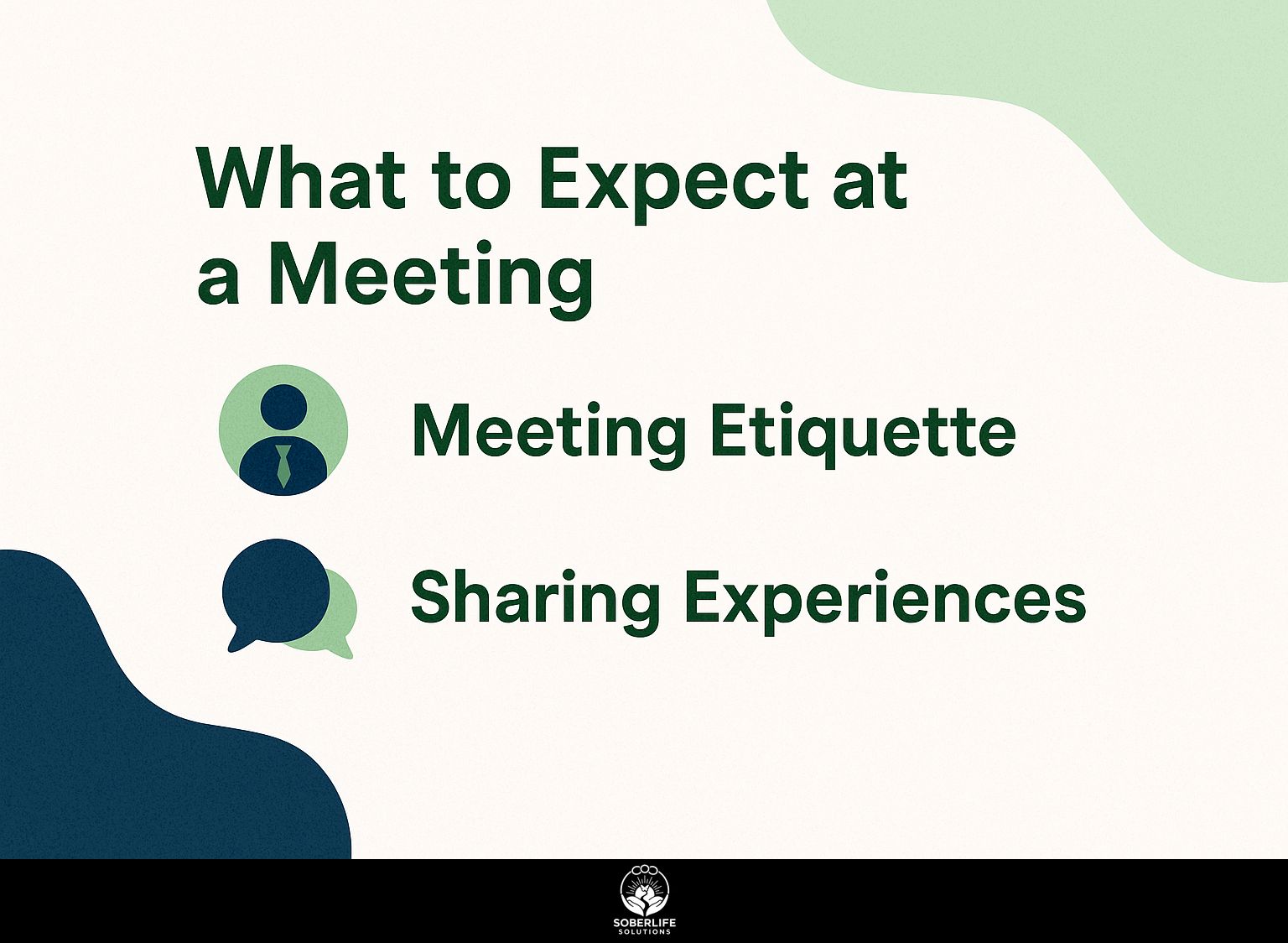
Knowing what happens at an A.A. meeting can make newcomers feel more comfortable and help make the meeting more inviting for everyone.
Meeting Etiquette
It’s important to follow the guidelines in A.A. meetings to maintain respect and support, which helps everyone feel comfortable sharing their experiences.
Key etiquette rules include maintaining confidentiality, practicing active listening, and respecting time limits.
Keeping shared experiences private builds trust. Active listening demonstrates empathy and encourages deeper connections among members. Sticking to time limits allows everyone to speak and keeps discussions focused.
By concentrating on these principles, meetings can be more productive and friendly, making the group environment better and making sure everyone feels valued and listened to.
Sharing Experiences
Sharing personal experiences in meetings can be a powerful tool for healing and connection among members, reinforcing the community’s strength.
When sharing, aim for authenticity; discuss both successes and challenges to create a relatable experience.
Begin by setting a comfortable tone; for instance, start with a brief personal story that highlights a lesson learned. Tell others that speaking freely is appreciated, and that everyone’s thoughts matter.
To encourage participation, try asking questions that require more than a yes or no answer to start a conversation. This motivates more people to participate and helps everyone understand common problems and achievements.
Support and Resources
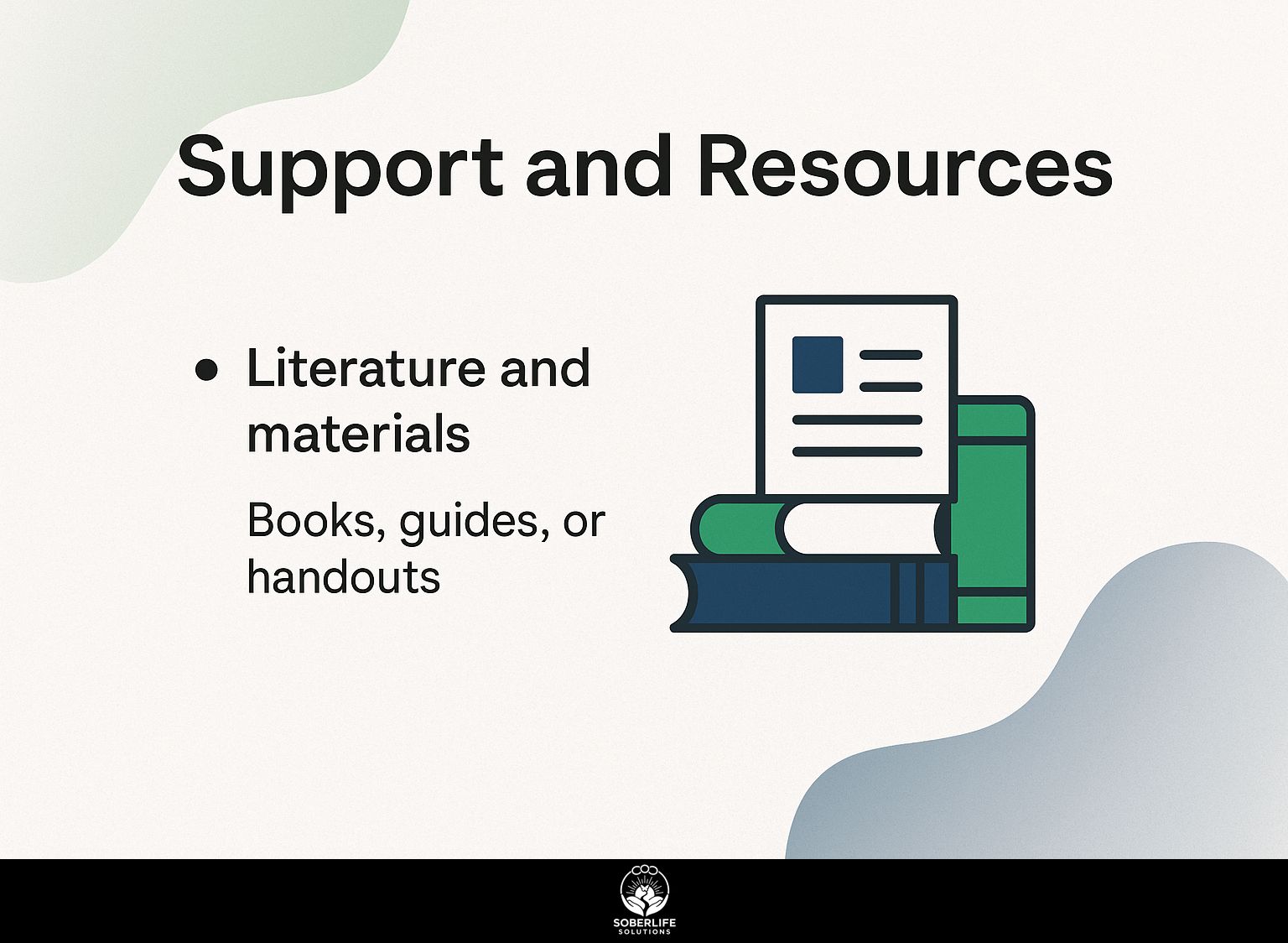
A.A. offers many materials and books to help members with their recovery, such as the Big Book and pamphlets that talk about typical difficulties. For those new to the process, exploring how to find A.A. meetings can be a valuable step in understanding and overcoming challenges.
Literature and Materials
A.A. literature, including the Big Book and the MG-15 publication, serves as essential texts for learning about the program and the principles of recovery.
These texts are available both online and in print for members to study individually or in group settings.
For instance, the Big Book is often used in meetings as a discussion guide, while pamphlets like ‘This Is A.A.’ can help newcomers grasp the basics of the program.
Members can access these materials through the A.A. website or local literature distributions. Reading these texts carefully helps you grasp their ideas better and strengthens the key concepts, turning them into useful aids for recovery.
Frequently Asked Questions
What is Alcoholics Anonymous and how do I join?
Alcoholics Anonymous, commonly referred to as AA, is a worldwide fellowship of individuals who have struggled with alcohol addiction. To join, you can simply attend a meeting and consider yourself a member. No formal registration or fees are required.
What happens at an AA meeting?
AA meetings typically begin with a reading of the 12 Steps and 12 Traditions, followed by members sharing personal experiences and reflections. The meetings offer help, advice, and a feeling of belonging for people dealing with alcohol addiction.
Do I have to speak at an AA meeting?
No, you do not have to speak at an AA meeting. Participation is voluntary, and you are welcome to simply listen and observe. However, lots of people feel better and find it helpful for their healing when they talk about what they’ve been through and how they feel.
Are AA meetings confidential?
Yes, AA meetings are considered confidential. Members are expected to respect the anonymity and privacy of others and refrain from sharing personal information outside of the meeting. This provides a secure and accepting space for people who need help.
Are there any requirements to join AA?
The only requirement to join AA is the desire to stop drinking. There is no age, education, or religious requirement, and anyone with a desire to overcome their alcohol addiction is welcome to attend meetings and become a member.
Is AA a religious organization?
No, AA is not a religious organization. Although the program does mention a higher power, it is open to individual interpretation and does not promote any specific religious beliefs. The focus of AA is on personal growth and recovery from alcohol addiction, not religious conversion.

